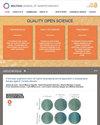Curcumin-loaded nanostructured systems for treatment of leishmaniasis: a review
IF 2.6
4区 材料科学
Q3 MATERIALS SCIENCE, MULTIDISCIPLINARY
引用次数: 0
Abstract
Leishmaniasis is a neglected tropical disease that has affected more than 350 million people worldwide and can manifest itself in three different forms: cutaneous, mucocutaneous, or visceral. Furthermore, the current treatment options have drawbacks which compromise efficacy and patient compliance. To face this global health concern, new alternatives for the treatment of leishmaniasis have been explored. Curcumin, a polyphenol obtained from the rhizome of turmeric, exhibits leishmanicidal activity against different species of Leishmania spp. Although its mechanism of action has not yet been fully elucidated, its leishmanicidal potential may be associated with its antioxidant and anti-inflammatory properties. However, it has limitations that compromise its clinical use. Conversely, nanotechnology has been used as a tool for solving biopharmaceutical challenges associated with drugs, such as curcumin. From a drug delivery standpoint, nanocarriers (1–1000 nm) can improve stability, increase solubility, promote intracellular delivery, and increase biological activity. Thus, this review offers a deep look into curcumin-loaded nanocarriers intended for the treatment of leishmaniasis.用于治疗利什曼病的姜黄素负载纳米结构系统:综述
利什曼病是一种被忽视的热带疾病,已影响到全球 3.5 亿多人,可表现为皮肤、粘膜或内脏三种不同形式。此外,目前的治疗方案存在一些缺点,影响了疗效和患者的依从性。面对这一全球健康问题,人们开始探索治疗利什曼病的新替代疗法。姜黄素是从姜黄根茎中提取的一种多酚,对不同种类的利什曼原虫具有利什曼杀灭活性。虽然其作用机制尚未完全阐明,但其利什曼杀灭潜力可能与其抗氧化和抗炎特性有关。然而,它的局限性影响了其临床应用。相反,纳米技术已被用作解决姜黄素等药物的生物制药难题的工具。从给药的角度来看,纳米载体(1-1000 纳米)可以提高稳定性、增加溶解度、促进细胞内给药并增加生物活性。因此,本综述深入探讨了用于治疗利什曼病的姜黄素纳米载体。
本文章由计算机程序翻译,如有差异,请以英文原文为准。
求助全文
约1分钟内获得全文
求助全文
来源期刊

Beilstein Journal of Nanotechnology
NANOSCIENCE & NANOTECHNOLOGY-MATERIALS SCIENCE, MULTIDISCIPLINARY
CiteScore
5.70
自引率
3.20%
发文量
109
审稿时长
2 months
期刊介绍:
The Beilstein Journal of Nanotechnology is an international, peer-reviewed, Open Access journal. It provides a unique platform for rapid publication without any charges (free for author and reader) – Platinum Open Access. The content is freely accessible 365 days a year to any user worldwide. Articles are available online immediately upon publication and are publicly archived in all major repositories. In addition, it provides a platform for publishing thematic issues (theme-based collections of articles) on topical issues in nanoscience and nanotechnology.
The journal is published and completely funded by the Beilstein-Institut, a non-profit foundation located in Frankfurt am Main, Germany. The editor-in-chief is Professor Thomas Schimmel – Karlsruhe Institute of Technology. He is supported by more than 20 associate editors who are responsible for a particular subject area within the scope of the journal.
 求助内容:
求助内容: 应助结果提醒方式:
应助结果提醒方式:


